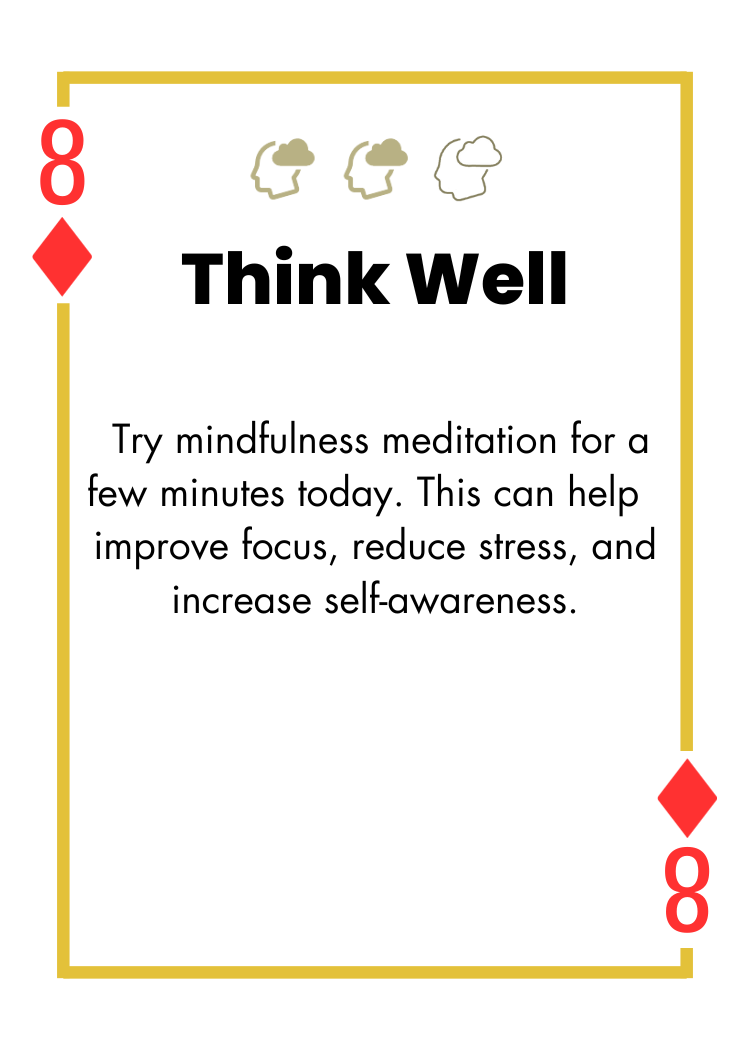8 of Diamonds - Mindfulness


Mindfulness requires deep concentration on events happening in the present moment. The concept of mindfulness is an emerging tool of individual attention training within the area of mainstream wellness. Individuals who practice mindfulness maintain a distance from judgment but observe present circumstances from a clear and enlightened place (Hocevar, 2023).
A good definition of mindfulness comes from one of the promoters of modern mindfulness, Dr. Jon Kabat-Zinn, professor emeritus of medicine at The University of Massachusetts Medical School. Mindfulness is a state of committed and receptive attention to the present moment, embodied by non-judgmental awareness of one’s thoughts, feelings, bodily sensations, and the surrounding environment (Kabat-Zinn, 1990).
The practice of mindfulness stems from ancient Buddhist traditions and has been adapted and applied to contemporary wellness practices. Mindfulness is an extension of Buddhist meditation practices especially from the Vipassana and Zen traditions (Sekhon, 2023).
Vipassana, translated as “insight” or “clear seeing,” is a method of meditation which concentrates on observing the nature of reality and collecting insight into the impermanent and interconnected nature of existence (Hanh, 2016). Zen emphasizes direct experience and the cultivation of mindfulness to attain awakening (Kapleau, 2013).


Mindfulness meditation
There are a multitude of ways to perform mindfulness meditation but here are a few to get you started:
Firstly, mindful breathing. Become aware of the sensation of your breath as it enters and exits your body. Pay attention to the rise and fall of your belly or the feeling of air passing through your nose (Brown & Ryan, 2003).
Secondly, doing a full body scan. Lie down or sit down comfortably. Then systematically bring attention to different parts or areas of your body. Start with the top of your head and make your way downward to your toes. Notice any sensations, tensions, or areas of discomfort without judgment (Kabat-Zinn, 2013).
Lastly, loving/kindness meditation. This type of meditation involves aiming positive messages and compassion towards oneself and others. Begin by generating feelings of kindness towards yourself and then direct those feelings to your loved ones, acquaintances, and even individuals you deal with who may be difficult at times (Fredrickson et al., 2008).
When you begin to do meditation, you may become more aware of any anxiety or stress you may be experiencing. At first, this could feel challenging for you and as you progress through learning the art of meditation this should get better. You might get frustrated when your mind wanders. This feeling is a common part of mindfulness practice, and you will bit by bit learn to bring your focus back to the present. If you have a history of trauma or severe mental illness, please consult with your therapist or mental health provider before beginning mindfulness meditation. (Journal of Midwifery and Women’s Health, 2023)
Many useful meditation practices may be found here:
UCLA Mindfulness Awareness Research Center
https://www.uclahealth.org/programs/marc/free-guided-meditations/guided-meditations
Mindfulness-based interventions have shown promise in reducing stress, anxiety, and depression symptoms, while enhancing overall well-being (Sekhon, 2023). Benefits of mindfulness include stress reduction, lower blood pressure, improved outcomes for heart disease, better quality sleep, and improved pain management and digestive health (Hocevar, 2023).
Janssen et al. (2018) research study participants who participated in a mindfulness-centered stress reduction program showed substantial reductions in perceived stress and physiological markers of stress. Additionally, research conducted by Creswell et al. (2014) discovered mindfulness training reduced reactions to stress and improved resilience among individuals subjected to a laboratory stressor. The findings in these studies suggest that mindfulness practices can enhance stress-coping abilities and lessen the negative impact of stress on mental health. Current research suggests mindfulness interventions can be effective in reducing symptoms of anxiety (Sekhon, 2023).
Finally, Hofmann et al. (2010) reviewed multiple studies and found mindfulness-type therapies were associated with moderate improvements in anxiety outcomes. These findings suggest that mindfulness practices may serve as a valuable accompaniment therapy to conventional treatments for depression (Sekhon, 2023).
You may wish to check out the Calm app on your phone or computer. Calm offers over 100 meditations directed by experts in the field. Meditations are targeted toward a variety of issues you may be experiencing. Calm also has a variety of other wellness aids such as body stretches, breathing exercises, nature sounds, relaxing music, and relaxing scenic views (May and Maurin, 2021).
Mindful Communications
https://www.mindful.org/
Mindfulness and Meditation
https://www.harvard.edu/in-focus/mindfulness-meditation/
(2023), Mindfulness Meditation. Journal of Midwifery and Women’s Health., 68: 687-688. https://doi.org/10.1111/jmwh.13565
Brown, K. W., & Ryan, R. M. (2003). The benefits of being present: Mindfulness and its role in psychological well-being. Journal of Personality and Social Psychology, 84(4), 822-848.
Creswell, J. D., Pacilio, L. E., Lindsay, E. K., & Brown, K. W. (2014). Brief mindfulness meditation training alters psychological and neuroendocrine responses to social evaluative stress. Psychoneuroendocrinology, 44, 1-12.
Fredrickson, B. L., Cohn, M. A., Coffey, K. A., Pek, J., & Finkel, S. M. (2008). Open hearts build lives: Positive emotions, induced through loving-kindness meditation, build consequential personal resources. Journal of Personality and Social Psychology, 95(5), 1045.
Hanh, T. N. (2016). The miracle of mindfulness: An introduction to the practice of
meditation. Beacon Press.
Hocevar, R. (2023). Mindfulness. Salem Press Encyclopedia.
Hofmann, S. G., Sawyer, A. T., Witt, A. A., and Oh, D. (2010). The effect of mindfulness-
based therapy on anxiety and depression: A meta-analytic review. Journal of
Consulting and Clinical Psychology, 78(2), 169.
Janssen, M., Heerkens, Y., Kuijer, W., Van Der Heijden, B., and Engels, J. (2018). Effects of mindfulness-based stress reduction on employees’ mental health: A systematic review. PloS one, 13(1), e0191332.
Kabat-Zinn, J. (1990). Full catastrophe living: The program of the stress reduction clinic at the University of Massachusetts Medical Center. Delta.
Kabat-Zinn, J. (2013). Full catastrophe living: Using the wisdom of your body and mind to face stress, pain, and illness. Bantam.
Kapleau, R. P. (2013). The three pillars of Zen. Anchor.
May, A. D. and Maurin, E. (2021). Calm: A review of the mindful meditation app. Families, Systems, & Health, 39 (2), 398-400. https://doi.org/10.1037/fsh0000621.
Sekhon, A. (2023). Mindfulness and its impact on mental health: A Review. Indian Journal of Positive Psychology, 14(2), 252–255.


 See Other Cards!
See Other Cards!